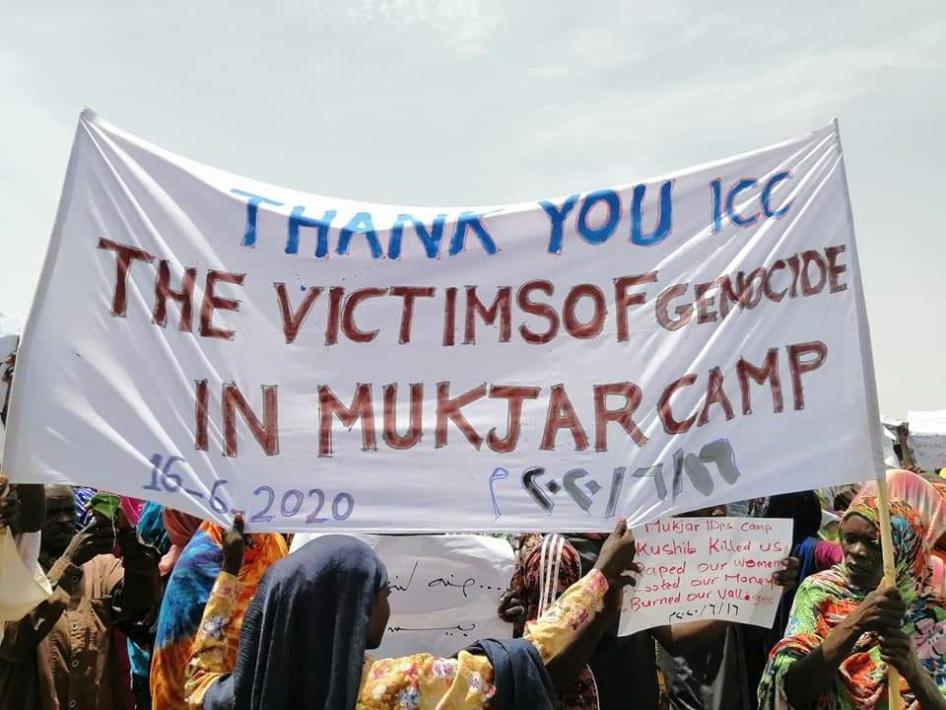(Washington, DC) – The United States should reaffirm support for justice for victims of grave international crimes around the world, Human Rights Watch said in a report released today. As the administration of President Joe Biden renews the United States’ commitment to multilateralism, it should ensure that support for accountability for war crimes, crimes against humanity, and genocide is a key component of a human-rights-focused foreign policy.
The 27-page report, “Essential Proposals to the Biden Administration to Advance International Justice,” outlines five areas in which the United States can demonstrate a consistent commitment to justice for victims of atrocities. Human Rights Watch details the ways the US government can advance this objective for specific countries like Ethiopia and Myanmar. It also urges the US government to support the International Criminal Court (ICC), other international or hybrid institutions like the Special Criminal Court in the Central African Republic, and national prosecutions, including those brought under the principle of universal jurisdiction.
“President Biden has signaled a renewed commitment to work with allies and participate in multilateral institutions,” said Liz Evenson, associate international justice director at Human Rights Watch. “Supporting justice for victims of the most serious international crimes should be at the forefront of the administration’s commitment. As a component of the rule of law, international justice strengthens cooperation across governments and is central to the fight against impunity worldwide.”
Promoting accountability through criminal prosecutions is critical for victims and their families to obtain justice and plays a role in ending cycles of violence. US support has been critical to effective justice processes in countries around the world, from Bosnia to Sierra Leone. Despite expressed bipartisan support for international justice, the US position on the ICC, the centerpiece of this evolving system, has changed over the last several administrations. It has ranged from initial hostility under the George W. Bush administration to more open support and cooperation under the Obama administration. Under the Trump administration, the US levied punitive measures against ICC staff, including financial sanctions and entry bans, in an effort to thwart investigations in Afghanistan and Palestine. When President Biden removed these unprecedented penalties in April 2021, he began what could be an overdue process of restoring US credibility on international justice.
The US government should help bolster accountability for war crimes and possible crimes against humanity in Ethiopia’s Tigray region, crimes against humanity and acts of genocide against the Rohingya in Myanmar, and other atrocities committed elsewhere, Human Rights Watch said.
This includes supporting UN-mandated investigative mechanisms and US re-engagement with the United Nations Human Rights Council, which has an essential role to play in promoting justice. Human Rights Watch also makes specific country-by-country recommendations in its report to strengthen credible, fair proceedings before national and hybrid (that is, mixed international-national) courts.
Meaningful support for international justice needs to include the ICC, Human Rights Watch said. While lifting the Trump administration sanctions, the Biden administration made clear that the United States continues to oppose the “ICC’s actions” in Afghanistan and Palestine, and more generally any ICC jurisdiction over the nationals of states that have not joined the ICC. The ICC has opened investigations in both these situations, although the investigation in Afghanistan is currently on hold. These investigations could include scrutiny of alleged crimes committed by US and Israeli nationals, respectively. US objections to the ICC’s jurisdiction have no basis in the law and reinforce impunity.
The Biden administration should view these investigations through the lens of countering impunity for the worst human rights abuses. The investigations are by no means limited to crimes allegedly committed by US and Israeli nationals, but could extend to crimes committed against civilians by multiple actors, including the Taliban, Afghan government forces, and Palestinian armed groups, providing a long-awaited path to justice for victims.
Through procedures in the ICC’s founding treaty, the Rome Statute, the United States could seek to preempt ICC scrutiny of conduct by US nationals by genuinely investigating and appropriately prosecuting alleged crimes committed in connection with the Afghanistan conflict. Secretary of State Antony Blinken has recognized in principle that the US should “lead by the power of our example.” To persuade other countries to seek accountability for grave crimes, and to have credibility in standing for justice internationally, the US should commit to genuinely confront its past abuses in relation to the conflict in Afghanistan and to put in place policies that prevent future abuses, Human Rights Watch said.
“As the court of last resort, the ICC has a critical role to play and the Biden administration should not allow narrow concerns about certain investigations to undermine its broader commitment to accountability,” Evenson said. “The Biden administration should demonstrate it is serious about a human-rights-centered foreign policy by standing with its allies in supporting justice for victims of serious international crimes and making ICC cooperation the rule.”








